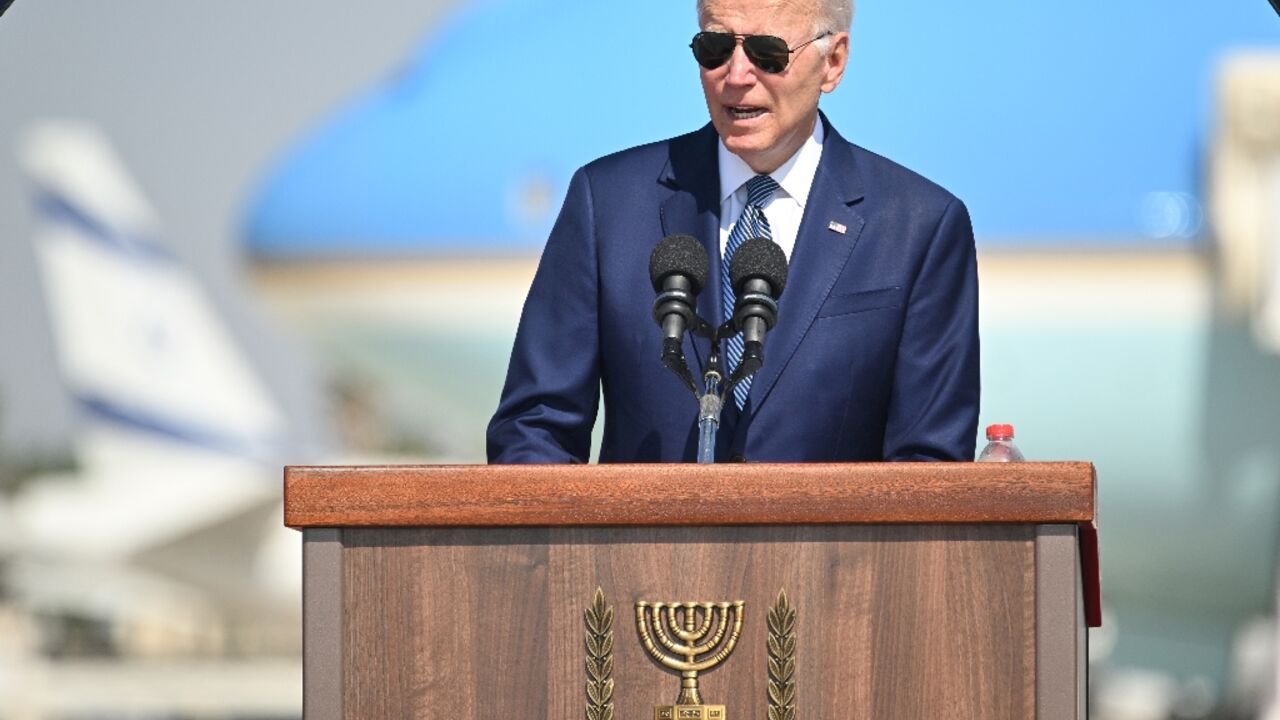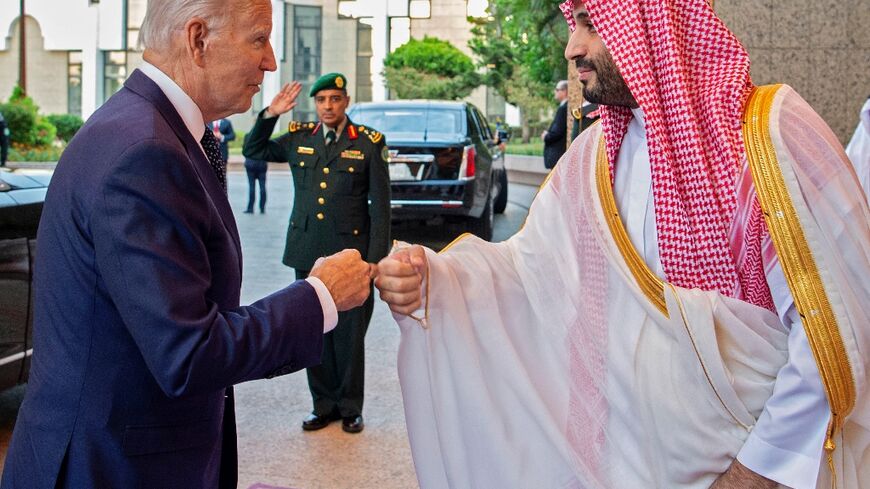Biden visits Israel on first Middle East tour as US president

US President Joe Biden on Wednesday kicked off a Middle East tour in Israel where both sides vowed to deepen the Jewish state's integration in the region as they face their common foe Iran.
Biden -- whose first regional visit since taking office will also bring him to Saudi Arabia -- pledged strong backing for Israel, which has forged ties with several Arab states in recent years and hopes to do so with Riyadh as well.
"We'll continue to advance Israel's integration into the region," Biden said after Air Force One touched down at Ben Gurion airport near Tel Aviv to a red-carpet welcome, while underscoring Washington's "bone deep" connection to the Jewish state.
"I'm proud to say that our relationship with the state of Israel is deeper and stronger in my view than it's ever been. With this visit, we're strengthening our connections even further," the president said.
Israel's caretaker prime minister Yair Lapid said that "we will discuss building a new security and economy architecture with the nations of the Middle East", following US-brokered accords in 2020 with the UAE, Bahrain and Morocco.
"And we will discuss the need to renew a strong global coalition that will stop the Iranian nuclear programme," he added, amid ongoing efforts by world powers to salvage Iran's frayed 2015 nuclear deal.
Biden's visit to Saudi Arabia on Friday will be the major focus of the tour, after he branded the oil-rich kingdom a "pariah" over the 2018 murder of dissident Saudi journalist Jamal Khashoggi.
The trip is seen as part of efforts to stabilise oil markets rattled by the war in Ukraine, through a re-engagement with a long-time key US strategic ally and major energy supplier.
Air Force One will make a first direct flight from Israel to Saudi Arabia amid efforts to build ties between the Jewish state and the conservative Gulf kingdom, which does not recognise Israel's existence.
- Palestinian anger -
After Biden landed, Israel's military showed him its new Iron Beam defence system, an anti-drone laser it claims is crucial to countering Iran's fleet of unmanned aerial vehicles.
Israel insists it will do whatever is necessary to thwart Iran's nuclear ambitions, and remains staunchly opposed to a restoration of the 2015 deal that gave Tehran sanctions relief.
Iran's President Ebrahim Raisi warned earlier Wednesday that if Biden's goal on the trip was to bolster Israel's security, his "efforts will not create security for the Zionists in any way".
After the Israeli military showcase, the US presidential motorcade headed to Jerusalem, where Biden visited the Yad Vashem Holocaust memorial, meeting with survivors of the Nazi genocide and inscribing a note that read: "We must never, ever, forget, because hate is never defeated."
Israel has raised 1,000 flags across Jerusalem to welcome the US leader, who has not reversed former president Donald Trump's controversial decision to recognise the city as the capital of the Jewish state.
Biden, 79, will also meet Palestinian leaders angered by what they describe as Washington's failure to curb Israeli aggression.
The persistent frustrations of Israeli-Palestinian diplomacy are nothing new for Biden, who first visited the region in 1973 after being elected to the Senate.
Palestinians claim Israeli-annexed east Jerusalem as their capital and, ahead of the visit, accused Biden of failing to make good on his pledge to restore the United States as an honest broker in the conflict.
- 'Two-state solution' -
"We only hear empty words and no results," said Jibril Rajoub, a leader of the secular Fatah movement of Palestinian president Mahmud Abbas.
In remarks to Israeli officials at the airport, Biden emphasised his continued backing for Palestinian statehood.
"A two-state solution," he said, remains "the best way to ensure" a prosperous future "for Israelis and Palestinians alike".
But there are no expectations of a new US peace push, with Israel still mired in political gridlock ahead of a November 1 election, the fifth in less than four years.
US-Palestinian ties have been strained by the May killing of Al Jazeera reporter Shireen Abu Akleh while she was covering an Israeli army raid in the West Bank.
The United Nations has concluded the Palestinian-American journalist was killed by Israeli fire. Washington has agreed this was likely, but also said there was no evidence the killing was intentional.
Abu Akleh's niece Lina told AFP Wednesday that the family remains "outraged" over Washington's struggles to push for Israeli accountability.
US Secretary of State Antony Blinken, who is travelling with Biden, on Wednesday invited Abu Akleh's relatives for talks in Washington, but Lina Abu Akleh told AFP the family's request to meet American officials in Jerusalem had not yet been answered.











